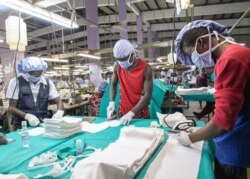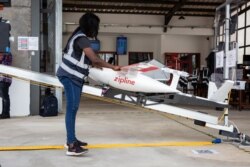In Ghana, the COVID-19 pandemic has spurred people to adopt innovations in health care, from apps that help diagnose coronavirus symptoms to drones transporting blood samples. As confirmed infections continue to rise in Ghana, reaching over 6,000 cases and more than 30 deaths, health tech experts want to ensure people have access to needed medicine and doctors.
For the last few years, health care tech company Redbird has been working to ease the burden on hospitals in Ghana with technology that can help pharmacies diagnose and monitor chronic and tropical diseases, saving user information on an app.
Now the company has added a function that helps people diagnose whether they have COVID-19. Users can input symptoms into an app and keep track of their movements to determine if they have been in contact with a confirmed case.
Co-founder of Redbird Andrew Quao says organizations can use the app to prevent the coronavirus from spreading in the workplace.
“Organizations are going to have to go back to work, and you are going to have to find a safe way of coming back to work," he said. "Not every organization can work remotely, so this is something that is moving ahead and helping organizations to sort of plan this, and be able to say ‘Ok I know my people, we are going to be back in two weeks — I want to know everyone who has been in touch with a COVID patient — okay you don’t need to come, let’s not risk it for the other people.’”
With a shortage of health care facilities across Ghana, and to encourage social distancing, Ghana’s doctors have looked to technology to consult patients remotely.
Dr. Emeline Opoku has started consulting patients via a mobile application, which she sees as a way to provide health care while ensuring people stay home as much as possible.
“When the pandemic started, I noticed that most of the people were scared to come to the clinics or the hospitals because they were scared [that] they were going to get an infection from there. So, then Talamus reached out to me and were like, ‘How about we use this as an opportunity to use telemedicine to reach out to patients,” said Opoku.
Talamus is a company set up by a Ghanaian doctor who lives in the U.S.
Country manager for Talamus Ghana Joshua Owusu-Ansah says the app Opoku is using is part of his organization’s mobile health platform, where all aspects of a patients’ health care can be accessed digitally.
He says COVID-19 has underscored the need to utilize technology for health care.
“I think it’s going to be an eye opener, to show Ghanaians, and Africans especially, that there is less stressful ways of doing things," he said. "To get a lot of things done in Ghana and Africa is really, really hard because a lot of our systems are just kept manual. So, this is one of the eye-openers which will show us that we need to do some things using technology — we need to leverage technology.”
Perhaps the most famous example of health care tech in Ghana is the Silicon Valley company Zipline’s use of drones to transport medicine and blood samples.
Since the pandemic started, drones have been carrying samples from suspected COVID-19 patients to laboratories in big cities to speed up diagnosis and help authorities keep track of any outbreaks.







